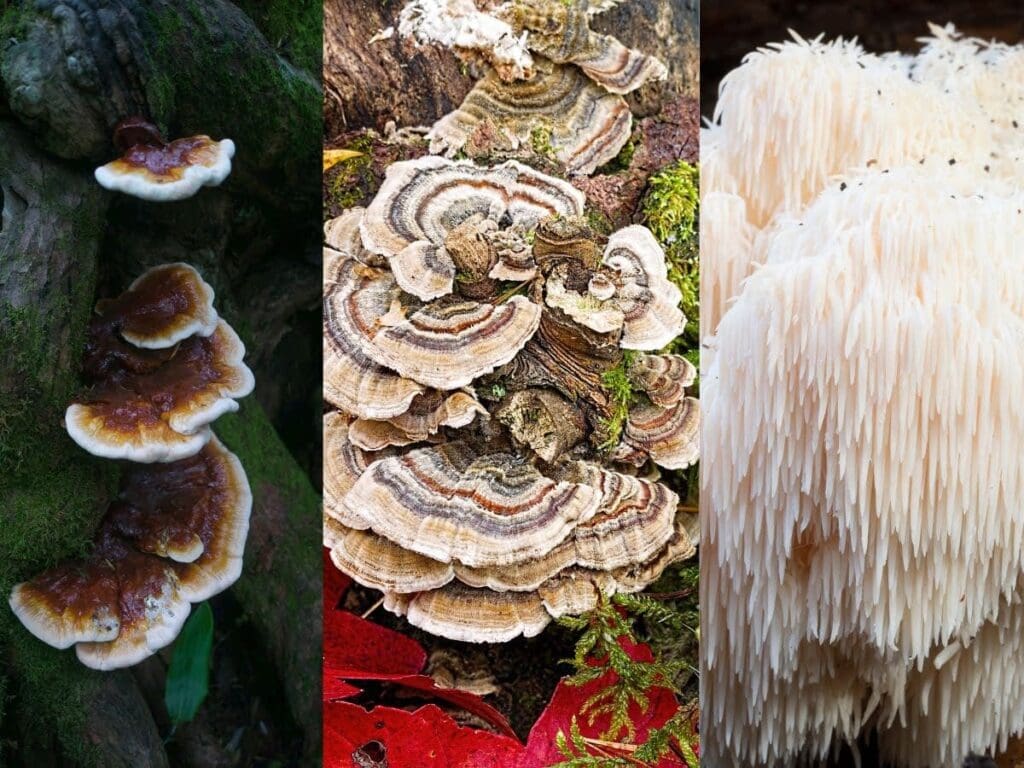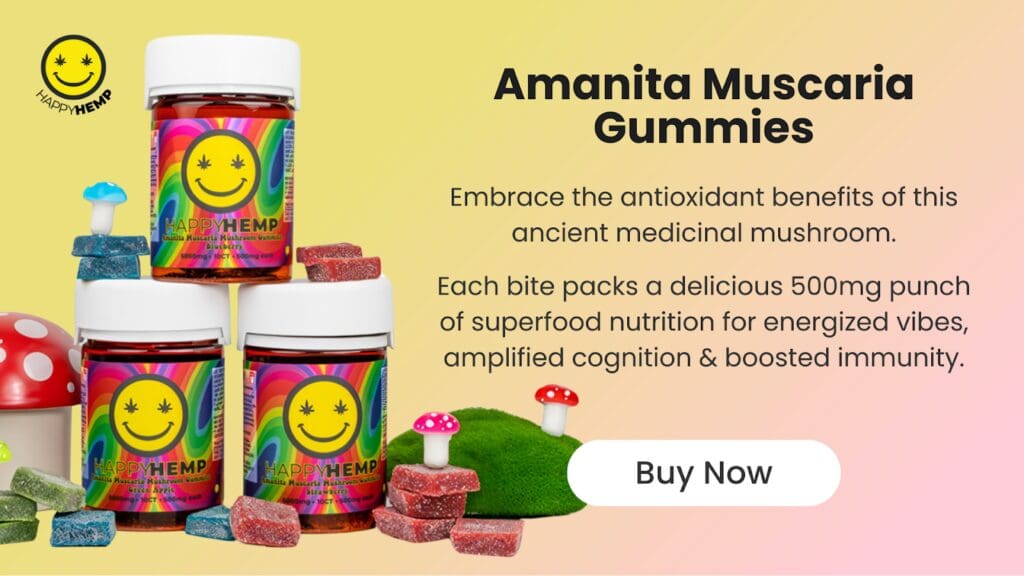Key Takeaways:
- Immune Boost: Medicinal mushrooms contain unique compounds like beta-glucans that naturally activate immune cells for stronger defenses.
- Science-Backed Benefits: Research supports the use of mushrooms like Reishi and Turkey Tail for their ability to enhance immunity and reduce inflammation.
- Daily Integration: Incorporating medicinal mushrooms consistently through high-quality supplements or blends can help sustain immune health and overall wellness.
Have you ever wondered if natural remedies could strengthen your immune system as effectively as modern supplements? Medicinal mushrooms, used for centuries in various cultures, are now gaining scientific backing for their powerful immune-boosting abilities. Unlike traditional supplements, medicinal mushrooms support immunity holistically, enhancing your body’s natural defenses without artificial additives. Studies show that compounds like beta-glucans and antioxidants in mushrooms stimulate immune cells, balance inflammation, and improve resilience against everyday stressors.
At Happy Hemp, we believe in the potent benefits of nature, and we’re proud to offer insights on natural wellness solutions that are backed by research and trusted by our community. With years of expertise in delivering high-quality, plant-based wellness products, Happy Hemp is dedicated to supporting your journey to a stronger, healthier immune system.
In this piece, we’ll explore how medicinal mushrooms can enhance your immune health, the best types to incorporate, and practical ways to add them to your daily routine.
How Medicinal Mushrooms Support Immune Function
Medicinal mushrooms have unique compounds that interact with the immune system in complex ways, helping it perform optimally. These fungi contain natural elements that enhance the body’s defenses, making them valuable allies for immune health. Let’s explore how medicinal mushrooms provide this support:
Boosting Immune Cells With Beta-Glucans
Beta-glucans, natural polysaccharides found in many medicinal mushrooms, play a key role in immune activation. When consumed, beta-glucans stimulate immune cells such as macrophages and natural killer cells, which are vital for detecting and attacking pathogens. By activating these immune cells, beta-glucans help the body mount a stronger defense against infections and harmful microorganisms.
Antioxidant Protection For Immune Health
Medicinal mushrooms are rich in antioxidants, compounds that protect cells from oxidative stress caused by free radicals. Oxidative stress can weaken immune cells and make them less effective in responding to pathogens. By reducing oxidative damage, the antioxidants in mushrooms support the integrity and functionality of immune cells, keeping the immune system robust and responsive.
Balancing The Immune Response
One of the unique benefits of medicinal mushrooms is their ability to balance immune activity. An overactive immune response can lead to chronic inflammation, which may harm healthy tissues over time. Compounds in mushrooms like Reishi and Shiitake help modulate immune responses, ensuring they are strong enough to combat infections but balanced to avoid excessive inflammation.
Supporting Gut Health To Enhance Immunity
The gut plays a major role in immune health, as it is home to a large portion of the immune system. Medicinal mushrooms contain prebiotic fibers that support gut health by feeding beneficial bacteria in the digestive tract. A healthy gut microbiome promotes a more effective immune system, as gut bacteria interact with immune cells and influence their function, ultimately contributing to a more resilient immune response.
Top Medicinal Mushrooms For Immune Support
Certain medicinal mushrooms stand out for their powerful immune-boosting properties, thanks to the unique compounds they contain. Each of these mushrooms offers distinct benefits, making them excellent choices for enhancing overall immunity. Here are some of the top medicinal mushrooms for immune support:
Reishi: The “Mushroom of Immortality”
Reishi mushrooms are known for their adaptogenic properties, which help the body manage stress and maintain balance. They contain beta-glucans and triterpenes, compounds that support immune function and reduce inflammation. Reishi is also known to have calming effects, which can help lower stress levels—an important factor in maintaining a strong immune system.
Shiitake: Rich In Essential Nutrients
Shiitake mushrooms are not only popular in cooking but are also packed with immune-boosting nutrients like B vitamins, copper, and selenium. These mushrooms contain lentinan, a compound that stimulates immune cell production and enhances the body’s ability to fight off infections. Shiitake also promotes gut health, supporting overall immune function.
Turkey Tail: A Powerful Antioxidant Source
Turkey Tail mushrooms are well-known for their high concentration of antioxidants, especially the polysaccharides PSP and PSK. These compounds support immune health by protecting cells from oxidative stress and boosting immune cell function. Turkey Tail has been extensively studied for its potential in supporting immune resilience, making it a popular choice for immune supplementation.
Maitake: Enhancing White Blood Cell Activity
Maitake mushrooms contain a unique compound called D-fraction, which has been shown to enhance the activity of white blood cells. These cells are essential for detecting and combating foreign invaders in the body. By supporting white blood cell function, Maitake mushrooms contribute to a stronger and more responsive immune system.
Key Compounds In Medicinal Mushrooms That Enhance Immunity
Medicinal mushrooms contain several bioactive compounds that directly influence immune health. These compounds help activate immune cells, reduce inflammation, and protect against cellular damage, making mushrooms valuable for immune support. Below are some of the key compounds found in medicinal mushrooms that contribute to their immune-boosting effects:
Beta-Glucans: Immune-Activating Polysaccharides
Beta-glucans are among the most studied compounds in medicinal mushrooms for their immune-enhancing effects. These polysaccharides bind to receptors on immune cells, triggering a cascade of immune responses that increase the activity of macrophages and natural killer cells. This activation helps the body detect and eliminate harmful pathogens, bolstering overall immune function.
Triterpenes: Anti-Inflammatory And Antioxidant Benefits
Triterpenes are compounds primarily found in Reishi mushrooms, and they offer both anti-inflammatory and antioxidant properties. By reducing inflammation, triterpenes help prevent chronic immune overactivation, which can otherwise lead to autoimmune issues or tissue damage. Their antioxidant effects also protect immune cells from oxidative stress, allowing for a more robust immune response.
Polysaccharide-K (PSK) And Polysaccharide-Peptide (PSP): Immune Modulators
PSK and PSP are polysaccharides found in Turkey Tail mushrooms, known for their immune-modulating effects. These compounds support immune health by stimulating white blood cell activity and helping balance the immune response. Studies have shown that PSK and PSP may support the body’s resilience against infections and promote a balanced, adaptive immune system.
Ergothioneine: A Unique Antioxidant
Ergothioneine is a unique antioxidant found in several mushrooms, including Shiitake and Maitake. This compound protects cells from oxidative damage and helps maintain cellular health. Ergothioneine’s antioxidant properties support immune cell longevity and functionality, enabling immune cells to respond effectively to threats over time.
Scientific Evidence Supporting Mushroom Immune Benefits
Scientific research increasingly supports the immune-enhancing properties of medicinal mushrooms, as studies reveal how their unique compounds interact with the immune system. Below, we’ll review some of the key scientific findings that highlight the immune benefits of these powerful fungi:
Clinical Studies On Reishi’s Immune-Boosting Effects
Studies have shown that Reishi mushrooms can modulate immune responses, particularly by enhancing the activity of immune cells like macrophages and T cells. One clinical trial demonstrated that Reishi supplementation led to an increase in these immune cells in healthy participants, suggesting its effectiveness in supporting immune health. Additionally, Reishi’s triterpenes have been studied for their anti-inflammatory properties, which contribute to its balanced immune effects.
Shiitake’s Role In Reducing Inflammation And Supporting Immunity
Research has highlighted the immune benefits of Shiitake mushrooms, especially due to their rich beta-glucan content. A study involving daily Shiitake consumption showed that participants experienced reduced levels of C-reactive protein, an inflammation marker, along with increased production of antibodies. These results suggest that Shiitake mushrooms may boost immune resilience while lowering inflammation levels.
Turkey Tail And Its Potential In Immune Modulation
Turkey Tail mushrooms have been extensively studied for their immune-modulating polysaccharides, PSP and PSK. Research in immunology has found that Turkey Tail’s compounds stimulate immune cell activity, including that of natural killer cells, which play a crucial role in fighting viral infections and abnormal cells. Studies have shown that these compounds help the body mount a faster, more targeted immune response.
Maitake And Enhanced White Blood Cell Function
Maitake mushrooms have shown promise in clinical studies focused on their effects on white blood cell function. The D-fraction found in Maitake has been observed to stimulate white blood cell activity, aiding in the detection and elimination of foreign invaders. This activity has been especially noted in research studying the effects of Maitake on immune function, showing enhanced defense mechanisms in participants.
Choosing The Right Mushroom Supplements
With so many mushroom supplements available on the market, it’s essential to choose high-quality products to reap the full immune-supporting benefits of medicinal mushrooms. Here are some factors to consider when selecting a mushroom supplement:
Look For Full-Spectrum Extracts
Full-spectrum extracts contain a broader range of the mushroom’s beneficial compounds, including beta-glucans, triterpenes, and polysaccharides. These extracts offer a more comprehensive immune boost, as they contain the full profile of compounds that work synergistically to support immune health. Check labels for terms like “full-spectrum” or “whole mushroom” to ensure you’re getting a complete extract.
Choose Organic And Certified Products
Organic certification ensures that the mushrooms used in the supplement are free from pesticides, heavy metals, and other contaminants that can compromise health. Additionally, look for products that have certifications from third-party testing organizations, as these can provide an added layer of assurance regarding product quality and purity.
Verify Beta-Glucan Content
Beta-glucans are the main immune-supporting compounds in medicinal mushrooms, so verifying their presence and concentration in a supplement is key. High-quality mushroom supplements should list the beta-glucan content, usually as a percentage on the label. Aim for supplements with a standardized beta-glucan content for the most consistent immune benefits.
Consider Powder, Capsule, Or Liquid Forms
Mushroom supplements are available in various forms, each with its own advantages. Capsules are convenient and easy to dose with gummies being the most popular right now for those looking for flavors, while powders can be added to smoothies or other foods for more versatility. Liquid extracts are often concentrated and can be quickly absorbed by the body. Choose the form that best fits your lifestyle and preferences.
Tips For Maximizing The Benefits Of Medicinal Mushrooms
To get the most immune support from medicinal mushrooms, it’s important to incorporate them effectively into your daily routine. Here are some tips to help you maximize the benefits of these powerful fungi:
Consistency Is Key
For medicinal mushrooms to have a noticeable effect, consistency is essential. Incorporating them into your routine on a daily basis allows the immune-boosting compounds to accumulate in your body, providing ongoing support. Try to set a schedule for your mushroom supplements, whether taking capsules in the morning or adding powder to a smoothie.
Combine Mushrooms For Enhanced Effects
Each type of medicinal mushroom offers unique compounds and benefits, so combining different mushrooms can provide a broader range of immune support. Many supplements offer mushroom blends, or you can mix individual powders like Reishi, Shiitake, and Turkey Tail for a more synergistic effect. This approach can enhance immune function by activating various immune pathways.
Pair Mushrooms With A Healthy Diet
Medicinal mushrooms work best when combined with a nutrient-rich diet that supports immune health. Eating a balanced diet full of fruits, vegetables, lean proteins, and whole grains helps provide the vitamins and minerals needed for a strong immune system. Pairing mushrooms with immune-boosting foods like citrus fruits, leafy greens, and ginger can further enhance their benefits.
Consult With A Healthcare Professional
If you’re new to medicinal mushrooms or have a specific health condition, it’s wise to consult a healthcare professional before adding new supplements to your regimen. A doctor or nutritionist can provide personalized advice on the right types and dosages of mushrooms based on your health needs, ensuring you use them safely and effectively.
Final Thoughts
Medicinal mushrooms offer a unique, natural way to strengthen the immune system and promote overall wellness. Through their bioactive compounds like beta-glucans, antioxidants, and immune-modulating polysaccharides, these fungi provide multi-faceted support that not only enhances immune cell activity but also balances inflammatory responses and protects against oxidative stress. As science continues to uncover the benefits of mushrooms like Reishi, Shiitake, and Turkey Tail, incorporating these powerful allies into our daily routines becomes an appealing strategy for long-term immune health.
Whether through high-quality supplements, blends, or even culinary use, medicinal mushrooms are accessible options for anyone seeking a natural boost to their immune resilience. With consistency, mindfulness, and the right choices, medicinal mushrooms can become a valuable part of a proactive health regimen. Embrace the benefits of these remarkable fungi and give your immune system the natural support it deserves.
Read Also:
- Top Mushrooms For Brain Health: What You Need To Know
- How Mushrooms Help Combat Inflammation: A Natural Approach to Wellness
- How Reishi Mushrooms Can Help Improve Your Sleep
Frequently Asked Questions About Medicinal Mushrooms
What Are Medicinal Mushrooms?
Medicinal mushrooms are varieties of mushrooms that contain health-promoting compounds. They’ve been used in traditional medicine for centuries to support immunity, reduce inflammation, and promote overall wellness.
How Do Medicinal Mushrooms Differ From Culinary Mushrooms?
While both types of mushrooms offer nutrients, medicinal mushrooms have specific bioactive compounds known to support the immune system. Culinary mushrooms are typically used for flavor and nutrition, whereas medicinal mushrooms are often consumed as supplements for their health benefits.
Are Medicinal Mushrooms Safe For Everyone?
Most people can safely consume medicinal mushrooms, but individuals with certain health conditions or allergies should consult a healthcare provider before use. Pregnant or breastfeeding women, as well as those on medication, should be particularly cautious.
Can Medicinal Mushrooms Be Taken With Other Supplements?
Yes, medicinal mushrooms are generally safe to combine with other supplements, but it’s best to consult with a healthcare professional. This ensures you won’t experience interactions that might affect the absorption or effectiveness of other supplements.
How Long Does It Take To See Results From Medicinal Mushrooms For Immune Support?
Results vary by individual and the specific mushroom used. Some people notice improvements in a few weeks, while others may need consistent use for a couple of months to experience noticeable immune support.
Are There Specific Medicinal Mushrooms Recommended For Seasonal Immunity?
Yes, Turkey Tail and Reishi mushrooms are popular choices for seasonal immune support. They’re known for enhancing resilience against common colds and other seasonal ailments. These mushrooms can help fortify the immune system during colder months when the body is more susceptible to infections.
Can I Cook With Medicinal Mushrooms Instead Of Taking Supplements?
Some medicinal mushrooms like Shiitake are used in cooking, but others, such as Reishi, have a bitter taste and are typically taken as supplements. Cooking may also reduce the potency of certain beneficial compounds.
Are There Any Side Effects Of Consuming Medicinal Mushrooms?
Side effects are rare but may include digestive issues or mild allergic reactions in some people. It’s best to start with a small dose to gauge your body’s reaction, especially if you’re new to these supplements.
Can Medicinal Mushrooms Improve Energy Levels?
Yes, medicinal mushrooms like Cordyceps are known to enhance energy by supporting oxygen flow and improving stamina. They’re often used by athletes and those looking for a natural energy boost.
What Is The Best Way To Store Medicinal Mushroom Supplements?
Store medicinal mushroom supplements in a cool, dry place, away from direct sunlight. This helps maintain their potency and ensures they last until the expiration date. For optimal freshness, consider storing them in an airtight container to prevent exposure to moisture and air.
Sources:
- Venturella, G., Ferraro, V., Cirlincione, F., & Gargano, M. L. (2021). Medicinal Mushrooms: Bioactive Compounds, Use, and Clinical Trials. International Journal of Molecular Sciences, 22(2), 634. https://doi.org/10.3390/ijms22020634
- Zhang, J.-J., Li, Y., Zhou, T., Xu, D.-P., Zhang, P., Li, S., & Li, H.-B. (2016). Bioactivities and Health Benefits of Mushrooms Mainly from China. Molecules, 21(7), 938. https://doi.org/10.3390/molecules21070938
- Medicinal Mushrooms (PDQ®)–Patient Version – National Cancer Institute. (2017, March 2). Www.cancer.gov. https://www.cancer.gov/about-cancer/treatment/cam/patient/mushrooms-pdq
- Cheung, P. C. K. (2010). The nutritional and health benefits of mushrooms. Nutrition Bulletin, 35(4), 292–299. https://doi.org/10.1111/j.1467-3010.2010.01859.x









